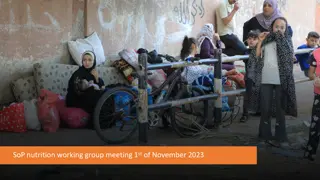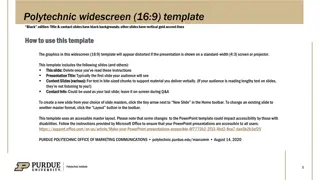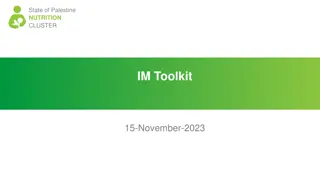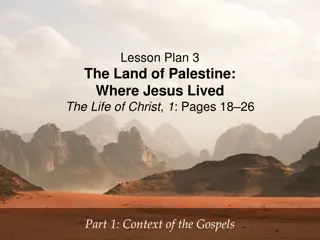Project-Based Learning Workshop at Palestine Polytechnic University
This workshop led by Emad Dawwas explores team vs individual work, criteria distinguishing group and individual projects, advantages/disadvantages of group work, and models for project integration in classes. It delves into various models like the Theory/Practice ratio and Distribution, offering insights for managing project activities effectively in academic settings.
Uploaded on Feb 26, 2025 | 1 Views
Download Presentation

Please find below an Image/Link to download the presentation.
The content on the website is provided AS IS for your information and personal use only. It may not be sold, licensed, or shared on other websites without obtaining consent from the author.If you encounter any issues during the download, it is possible that the publisher has removed the file from their server.
You are allowed to download the files provided on this website for personal or commercial use, subject to the condition that they are used lawfully. All files are the property of their respective owners.
The content on the website is provided AS IS for your information and personal use only. It may not be sold, licensed, or shared on other websites without obtaining consent from the author.
E N D
Presentation Transcript
PROJECT BASED LEARNING WORKSHOP By: Emad Dawwas At Palestine Polytechnic University
INTRODUCTION What is team work and how it differs from individual work?
INTRODUCTION What criteria make a project a group-work and what makes it an individual?
INTRODUCTION Do our students do team work?
INTRODUCTION What are the main advantages and disadvantages of group work?
WHAT MODELS ARE AVAILABLE FOR CLASSES WITH PROJECTS?
WHAT MODELS ARE AVAILABLE FOR CLASSES WITH PROJECTS? Several approaches to involve project activities in theoretical classes The challenge is always to manage these activities either: Theory/practice ratio Distribution Four models are suggested about the ratio and distribution.
MODEL 1 Very common model Theory is given more time (10 12 weeks) Practice follows the theory No enough time for follow up and scaffolding Theory Project
MODEL 2 No rush in the project activities but separated from the class materials Common in classes with labs Very difficult to manage Theory Project
MODEL 3 Project takes its time No rush in the project as both theory and practice go in parallel Difficult to manage More suitable for advanced classes (graduate classes) Theory Project
MODEL 4 Relatively equal time Theory portion is descending while project activities are ascending More suitable for introductory classes but still suitable for advanced ones More suitable for CBL Theory Project
PROJECT SELECTION Group formation Two approaches: One project for all groups One project for each group
PROJECT SELECTION What are the main criteria to consider when selecting a class project? Time Student quality Your confidence: how many time have you taught the class Is it from your core field
PROJECT SELECTION What are the main criteria to consider when selecting a practice-theory model? Theory Theory Project Project
PLANNING What are the main components of the action plan? How to distribute the work among the teams What pitfalls should be considered?
PLANNING EXAMPLE Course Plan Main Stage Week No. Session Topic Class - Introduction to GIS and Community Based Learning (CBL) - Course outline Exploring ArcMap 10 and ArcCatalog 10 --- Planning a GIS project: Stage 1) Data collection and assembling Stage 2) Data preparation Stage 3) Data analysis Stage 4) Data presentation - Geo-referencing and Projecting Spatial Data - Introducing Field Survey Form - Forming project teams - Training on data collection Week 1 Lab Field work Class Introduction Week 2 Lab Field work
PLANNING EXAMPLE Course Plan Class Collapse Mechanisms due to Earthquake in Urban Buildings Part 1 (Guest speaker from Urban Planning and Disaster Risk Reduction Center) Geo-referencing Nablus map Exercise 1: Building a Geodatabase using the data sample collected in Week 2 - Dividing the study area among different teams - Data collection Spatial Database Structures and Data Models Introducing basic vector and raster tools Exercise 2: Applying concepts of vector and raster analysis on the field data sets Data collection Lab Week 3 Stage 1: Data Collection and Assembling Field work Class Lab Week4 Field work
PLANNING EXAMPLE Course Plan Class Collapse Mechanisms due to Earthquake in Urban Buildings Part 2(Guest speaker from Urban Planning and Disaster Risk Reduction Center) Lab Investigating Data Management and Data Analysis toolboxes Week 5 Exercise 3: Applying Data Management and Data Analysis tools on the field data sets Field work Data collection Stage 2: Class Topology and ArcGIS 10 Network Analyst Extension Data Preparation Lab Working with Network Analyst Week 6 Exercise 4: Applying Network Analyst on Nablus road network Field work Data collection Class The Importance of an Earthquake Evacuation Plan for the City of Nablus (Guest speaker from Engineering Department in the municipality of Nablus) Week 7 Lab Midterm Exam Field work Data collection
PLANNING EXAMPLE Course Plan Week 8 Class Collapse Mechanisms due to Earthquake in Urban Buildings Part 3(Guest speaker from Urban Planning and Disaster Risk Reduction Center) Data analysis Data collection Case Study 1: Evacuation Planning in Earthquake Disasters, Using RS & GIS Data Analysis Data collection Case Study 2: An Interactive Mapping Application for Rapid Evacuation Planning Using GIS Midpoint Presentation Filling gaps in collected data Guidelines for organizing final analysis results Final results --- Lab Field work Class Lab Field work Class Week 9 Stage 3: Data Analysis Week 10 Lab Field work Class Lab Field work Week 11
PLANNING EXAMPLE Course Plan Week 12 Class Case Study 3: Developing a Transportation Plan for Evacuation of Builtup Areas in Case of Earthquake Collapse Generating final maps --- Guidelines for writing the final report Wrapping up: bringing all project s parts together --- Guidelines for preparing the final presentations Working on the final presentation --- Final report submission and final presentation Lab Field work Class Lab Field work Class Lab Field work Class Stage 4: Data Presentation Week 13 Week 14 Week 15
MANAGING AND EVALUATING How to plan and manage follow up meetings? What main criteria usually instructors consider when evaluating team projects? How to evaluate






















